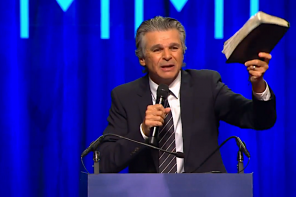Presidential hopeful Ben Carson’s claim that his flat tax proposal is based on biblical tithing is a “radical oversimplification in a number of ways,” says a tax lawyer and expert on the tithing concepts described in the Old Testament.
Adam Chodorow, a professor of law at Arizona State University, has written extensively on whether flat tax proposals that purport to be based on the biblical system of tithing accurately reflect the systems described in the text—and, significantly, rabbinical interpretation of those texts.
“To compare the tithe to taxes is deeply fraught, because this was not a secular tax system,” Chodorow said in an interview. Tithing, which Chodorow said took several different forms in biblical times, was a religious obligation, not legal requirement imposed by the government. (There was, in fact, no government.) Biblical tithing, in other words, is not adaptable to the modern secular state.
Carson, though, confidently claimed his flat tax idea, derived from the Bible, is workable in 21st century America. When asked by Fox News Sunday host Chris Wallace yesterday about his 10 percent flat tax proposal, Carson said:
Well, I like the idea of a proportional tax. That way you pay according to your ability. And I got that idea, quite frankly, from the Bible, tithing. You make $10 billion a year, you pay $1 billion. You make $10 a year, you pay $1. You get the same rights. That’s pretty darn fair, if you ask me.
Now, some people say it’s not fair because, you know, the poor people can’t afford to pay that dollar. That’s very condescending. You know, I grew up very poor. I experienced every economic level. And I can tell you poor people have pride, too. And they don’t want to be just taken care of.
And also, if everybody is paying, it makes it very difficult for these politicians to come along and raise taxes. It’s easy to raise it on 1 percent or 2 percent or 5 percent. It’s very difficult to raise it on 100 percent.
Chodorow identified several ways in which Carson misreads the biblical text. First, tithing was a religious obligation, developed to support religious authorities as well as the poor, not a tax imposed to fund governmental functions. In the Fox News interview, Carson suggests that poor people were not the beneficiaries of the tithe (just as he believes poor people should not receive assistance from the government), but rather part of a system in which they were treated equally with the more affluent.
Second, tithing was never actually a flat 10 percent. Contrary to Carson’s claim that the 10 percent figure applied without exception, shared equally because everyone paid the same proportion of their wealth, Jewish religious authorities created a progressive system based on a person’s wealth, said Chodorow. “At least in the Jewish tradition—and of course this is a Jewish practice that the Christians took over and ignored much of the marginalia about what it really meant—tithing was not a flat 10 percent, at least in the ancient Jewish world. It was a range of giving. That would undermine some of what Mr. Carson is saying.”
In the Bible, said Chodorow, farmers were obligated to tithe 10 percent of their yield to religious authorities—to the priests and t0 the Levites who maintained the Temple—as well as to the poor. In one example of the various ways tithing was required, Chodorow said that after returning to Israel from the Babylonian exile, the Levites were given no land, thus people with agricultural land were thus obligated to provide for them. Because there were no standard weights and measures, the 10 percent was arrived at more loosely, for example, every tenth container of produce was to be delivered to the Temple. Again, this flexibility undermines Carson’s claim to base his proposal on a uniform, biblical system.
In the non-agricultural context, tzedakah, a mitzvah, or commandment, in Judaism, is the concept of tithing most recognizable to modern-day Christians, including Catholics, Protestants, and Mormons. But again, that’s “a very fuzzy concept,” said Chodorow. “It doesn’t say 10 percent and no more.”
It gets even “more complicated” for Carson, said Chodorow, because “there are a range of taxes in the Bible, each employing a different allocation measure, suggesting a different equitable idea.” The first tax in the Bible, he said, was a Temple tax, a half shekel per person to build the Tabernacle. Yet later, the Talmud documents a spirited debate about how one would allocate the cost of building a wall. The rabbis came up with a system now known as the benefit theory of taxation—that people pay based on how much they would benefit from the service. That theory, though, has been dismissed in modern times because of the impossibility of determining such an allocation.
Chodorow said that he was “deeply troubled” by the idea that a system developed thousands of years ago could be perceived as one that is “divinely ordained for all time and for all societies.”
Rather than be true—if that’s possible—to biblical tithing, Carson actually neglects other biblical concepts of fairness and justice. Chodorow pointed to Luke 21:1-4, where Jesus says that the widow who gave two mites to the Temple had done more than a rich person giving more. There, Jesus “is basically saying we should be examining a tax system based on its impact on people, not on some abstract notion of sameness or fairness,” he said. “Anytime you decrease reduce the tax on the rich, you have to increase it on the poor, and is that a just society?”




